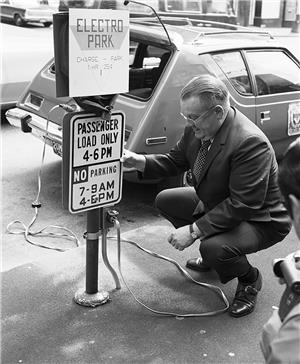On May 31, 1972, retired Fire Chief Gordon Vickery (1920-1996) becomes superintendent of Seattle City Light. Vickery takes over a utility that is a "patronage-laden caste system of uncivil servants" (Seattle Sun) and he will implement reforms to increase minority staffing and to improve efficiency.
Vickery was the second choice of Mayor Wes Uhlman (b. 1935) for a superintendent to succeed John D. Nelson (d. 1974) who retired at the mayor's request. The first nominee, R. D. Ford, was not confirmed by the City Council after City Light staff members lobbied against his appointment.
Unlike his predecessors, Vickery was not an engineer and he did not have a background in managing utilities. He took over at a point in time when City Light's fortunes were changing dramatically. The utility had enjoyed a great deal of independence from city government since it did not rely on taxes to operate. City Light offered one of the lowest electricity rates in the nation and the staff was allowed to set its own direction in finances, energy policy, and construction.
Vickery quickly announced that he would create citizen advisory councils to contribute to policy for the utility. Greater public involvement was a major component of the Uhlman Administration. Vickery also took steps to tighten work rules and enforce conduct for 1,900 employees. In November 1972, 18 employees were suspended for misconduct. Others were fired and prosecuted for theft.
Vickery was also confronted with an urgent need to find more electricity for Seattle. Demand continued to grow, but new sources were in short supply. Plans for a nuclear power plant at Kiket Island were shelved for environmental and safety reasons and the raising of Ross Dam also met opposition. The Bonneville Power Administration had announced limits to the current it could supply. Nuclear plants of the Washington Public Power Supply System (WPPSS) would not be available for years.
Eventually, Vickery was able to change the way that City Light operated. The utility no longer promoted the use of electricity. Instead, conservation became city policy. The number of minority and female employees increased, particularly in the trades. He weathered the longest strike by public employees in state history, several employee job actions, a recall campaign against Uhlman, and a record drought. In 1977, both mayoral candidates promised to fire him. The winner, Charles Royer, found that Vickery had a contract through 1978.
Vickery left City Light to become head of the National Fire Academy in Maryland.

